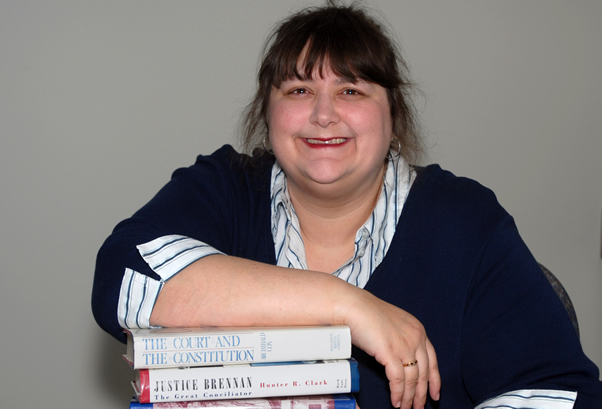Communications Law
Genelle Belmas Studies the Rights and Limits of Free Speech
February 19, 2008
By Pamela McLaren
Genelle I. Belmas relishes a good fight, especially when it is over the rights of speech in this country.
“I love researching and teaching this stuff,” says the assistant professor of communications who earned her doctorate in mass communication from the University of Minnesota.
As she talks, Belmas clicks to websites on her computer, pulls out articles and other material she has at her fingertips, using them to punctuate examples of free speech and communications issues. As she points out, no one need go further than the campus itself when looking at current events related to the issue of free speech, and nearly daily, issues do come up throughout the full spectrum: business, education, health, and government.
“I try to keep up to date,” she says modestly, “but it moves so quickly. And there’s always a controversy.”
A member of the campus community since 2004, Belmas teaches “Mass Communications in Modern Society,” “Communications Law,” “Investigative and Computer-Assisted Reporting” and “Communications Technologies.” She currently is developing an online version of the “Communications Law” course that she hopes to offer this summer.
“It will be the first time to offer this course in this way and if we’re successful, it means that we can offer the course — a requirement for all communications majors — to large numbers of students.”
Belmas has authored numerous articles and made conference presentations on a broad range of issues, including commercial use of public records and how the Federal Communications Commission handles claims of indecency and Internet pornography.
Q. One of the issues you’ve been delving into recently is the FCC and how it handles complaints about indecency. You have a couple of articles that should be coming out about that soon.
A: What I’ve found is that FCC’s definitions, reporting policies and standards are unclear. The agency doesn’t respond quickly or well to complaints. That’s unfair to both consumers and broadcasters. And because the commission’s standards are so undefined, it leaves broadcasters up in the air about what is OK and what isn’t.
One of the examples I give my students to explain what I’m talking about is the 2003 Golden Globe Awards when musician Bono used an expletive on live television when accepting an award. The FCC was fine with it, ruling that it was “fleeting.” Then Janet Jackson’s clothing mishap happened in 2004. The FCC reversed its policies and fined the network for Bono’s expression the year before. The Second Circuit Court of Appeals ruled that the FCC was wrong to go back and change the ruling, but last September, the FCC decided to challenge that court decision.
It makes for really interesting research.
Q. How did you get interested in communication’s issues like the Wisconsin Shield Law — the subject of your award-winning senior honors thesis (written while Belmas earned her bachelor’s degree in journalism and political science) at the University of Wisconsin?
A. I got interested because as I learned about shield laws – which I thought were really great tools to protect reporters who are trying to protect confidential sources that they use to get important information out into the public – I also learned that Wisconsin didn’t have one. More than 30 other states, including California, do. I wanted to know if reporters in Wisconsin were somehow penalized by not having a law to protect them. What I found out is that Wisconsin courts were very good about protecting reporter rights even without the shield law. Even today, Wisconsin doesn’t have a shield law, but I’m not worried – I think the courts there are doing a fine job balancing competing rights.
Q. What other big issues are going on right now?
A. Indecency’s probably is the biggest issue for me, but the FCC also has been messing with ownership rules, recently eliminating the longtime ban on newspaper-broadcast station cross-ownership in certain markets. I think the FCC will continue to make headlines with (FCC Commissioner) Kevin Martin’s attempt to leave his mark on the commission. Issues of online privacy also are key in this age of MySpace and YouTube. I think new law will probably be made there as aggrieved parties try to find out what anonymous person is posting bad stuff about them. In fact, a Chicago attorney who is unhappy with an anonymous blogger's comments about him and his firm is offering a $10,000 bounty for the blogger's identity! Intellectual property concerns will continue to be problematic as courts grapple with how to interpret a fair use.
Q. Other than to the world of broadcasting and mass media, why are these issues so important for the general public?
A. If I had my way, every university student would take a version of this class because many don’t understand where the rights that they so freely exercise came from. Nor are they as aware as I’d like them to be of the challenges that accompany that kind of freedom. Free speech is absolutely critical to an informed self-governing democracy and the media that help inform it. If my students leave the class knowing something about where the freedoms they enjoy came from, how they developed, what their limits are, and what to watch for in their professional media careers, I’m happy. I hope to inspire them not only to understand those freedoms, but to defend them – they are one of the freedoms worth fighting for.


